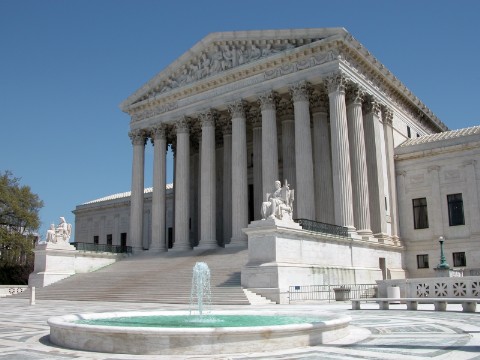The Supreme Court heard oral arguments today in Clapper v. Amnesty International, a case that will decide whether a group of American lawyers have standing to challenge the 2008 law that expanded the authority of the U.S. government to engage in electronic surveillance of overseas aliens suspected of terrorism. Although the law does not permit American citizens to be targeted for surveillance, the plaintiffs fear that the government will end up overhearing some of their conversations with those foreigners who are being targeted. The nine justices appeared to be closely divided on whether such fears are sufficient to support the plaintiffs’ standing claims.
In asking the Court to uphold their standing, the plaintiffs assert that if they are not permitted to challenge the surveillance law, then no one will be able to do so. They may well be correct in that assertion, but that is immaterial. If no potential plaintiff can demonstrate that he has been injured by the law, the courts have no reason to examine claims that the law might infringe on someone else’s constitutional rights. Of course, nothing prevents the plaintiffs from raising their concerns with appropriate officials in the Executive Branch and Congress, the branches of government with primary responsibility for national security matters.
The 2008 law is an outgrowth of the revelation by The New York Times in 2005 that the Bush Administration had adopted a Terrorist Surveillance Program (TSP), under which the overseas communications of suspected terrorists were being monitored. Some critics charged that the TSP violated the requirements of the Foreign Intelligence Surveillance Act (FISA), a 1978 congressional statute that sought to regulate the use of electronic surveillance for national security purposes. In response, Congress amended FISA in 2008 to establish a supplemental procedure whereby the Government could obtain judicial approval to engage in the sorts of overseas electronic surveillance undertaken pursuant to the TSP.
On the day that the amendments were enacted, several lawyers and several organizations (represented by the ACLU) filed a lawsuit seeking an injunction against the conduct of surveillance pursuant to the new law, the FISA Amendments Act (FAA). They alleged that the FAA violated their First and Fourth Amendments rights as well as separation-of-powers principles. Named as defendants are several senior Obama Administration officials, including Attorney General Eric Holder (whose authorization is required before any surveillance may be undertaken under the FAA). The federal appeals court in New York held that the plaintiffs had standing to challenge the FAA; in June, the U.S. Supreme Court agreed to review that decision.
The FAA does not permit U.S. citizens or resident aliens to be targeted for electronic surveillance regardless whether they are in this country or overseas. Nor does it permit targeting of non-resident aliens while they are located in the United States. Moreover, no surveillance is permitted until after it has been approved confidentially by a special Foreign Intelligence Surveillance Court, which must first determine (among other things) that the proposed surveillance does not violate the Fourth Amendment’s prohibition against unreasonable searches and seizures.
The Supreme Court has held repeatedly that a plaintiff lacks standing to challenge a defendant’s actions in federal court unless he can demonstrate that he has suffered an injury that is directly traceable to those actions. Even though the plaintiffs lack any direct evidence that they have been subjected to electronic surveillance under the FAA, they nonetheless contend that they have been injured by the statute because they fear that overseas individuals with whom they regularly communicate have been (or soon will be) targeted and thus that their communications with those individuals will be intercepted.
But such subjective fears of future injury have never been deemed sufficient to establish the injury necessary to support a federal court “standing” claim. The Supreme Court has held repeatedly that a future injury must be shown to be “imminent” before it is deemed sufficient to support standing. Nor has the Supreme Court ever permitted plaintiffs to create their own “injury” (as the plaintiffs in this case are attempting to do) by expending funds to travel overseas to speak directly with potential surveillance targets, supposedly for the purpose of diminishing the possibility that their conversations will be overheard.
The plaintiffs are correct, of course, in pointing out that it would be exceedingly difficult for any individual to establish standing to challenge the FAA if traditional standing rules were applied. The federal government acts surreptitiously when it undertakes electronic surveillance activity. Very few people ever discover that they have been subjected to electronic surveillance or that they will be targeted in the future. In the absence of such knowledge, it is virtually impossible to demonstrate with any degree of certainty that one has been injured by activities authorized under the FAA. The result might well be that no court will ever be in a position to decide the merits of a constitutional challenge to the FAA.
But no constitutional principle dictates that every federal statute should be subject to challenge in federal court. Indeed, the Supreme Court has stated repeatedly that the federal courts should be extremely reluctant to involve themselves in national security matters. The Executive Branch and Congress have examined the matter closely and have come up with a statutory scheme designed to balance the nation’s security needs with the constitutional rights of individual citizens. There is no reason for the courts to second-guess that balance at the behest of individuals who cannot even demonstrate that they have been injured thereby.
Moreover, as a group of six former U.S. Attorneys General pointed out to the Supreme Court (in an amicus curiae brief drafted by the Washington Legal Foundation), merely allowing the case to proceed to trial——and thereby requiring the federal government to defend itself by revealing details of its surveillance activities—would threaten national security. Disclosure of such information could prove valuable for enemies of the United States who seek to prevent their electronic communications from being intercepted.

